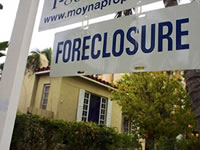Fannie Mae and Freddie Mac
Refinance
FHA loan ceiling raised back to $729,750
by Broderick Perkins
(11/21/2011) - President Obama signed legislation to restore the maximum home loan limit of $729,750 for federally insured loans, but only for Federal Housing Administration Loans (FHA) not Fannie Mae and Freddie Mac loans.
Stripped of the Fannie-Freddie provision to make even more home loans less expensive, the limited provision will be less effective than it could have been at helping improve housing market conditions.
FHA loans comprise a smaller portion of the home loan market than the Fannie-Freddie share.
"That's true, (Fannie and Freddie) have a bigger portion of the pie, but (the FHA provision) will certainly motivate many people who were holding off selling and getting a home with a higher value or more amenities," said Oakford Taylor, a real estate agent with Long and Foster Real Estate in Bear, DE.
Taylor added, "If they have a home to sell, that will create a domino effect that can help the economy."
In the waning days of an otherwise lackluster 112th Congress, the deal was part of a $182 billion spending bill that included funding for the government through Dec. 16.
The U.S. House of Representatives approved the measure 298-121, with 101 House Republicans opposing. Republicans in the House stripped the extension for Fannie and Freddie. The U.S. Senate voted 70-30.
FHA loans virtually replaced toxic subprime loans that helped plunge the housing market into darkness and the nation into the Great Recession. Last year, FHA-insured loans accounted for one third of home loan mortgages -- as much as 50 percent in some areas -- up from 5 percent in 2006, when housing teetered on the brink of collapse.
The FHA ceiling expires Dec. 31, 2013. It restores the option of an FHA loan of up to $729,750 with only 3.5 percent down at competitive market interest rates for qualified borrowers. However, low-down payment borrowers will have to pay mortgage insurance premiums that will add to their costs.
The other option for qualifying borrowers seeking loans between $625,500 and $729,750, is to take out "jumbo" loans that carry higher interest rates (as much as 1.5 percent higher than conforming loans) and typically require down payments of at least 20 percent.
Right now, Fannie Mae and Freddie Mac will only finance mortgages of up to $625,500.
Back in 2008, the Federal Housing Finance Agency (FHFA) set temporarily high conforming loan limits on federally-backed mortgages, hoping to put some liquidity back in the crippled mortgage market.
However, the government allowed the temporarily high $729,750 conforming loan limit on federally-backed mortgages to expire on Oct. 1, 2011 , as part of the government's effort to reduce its exposure to risk in the mortgage market.
After Oct. 1, the Feds lowered the ceiling to $625,500, but the level was much lower in many markets and now remains at those limits for Fannie and Freddie loans.
The National Association of Homebuilders said, after the rollback, some 5.3 million homes lost their eligibility for conforming loans. Nearly 670 counties saw their loan limits decline, according to the National Association of Realtors.
"Restoring the higher loan limits for the FHA will provide homeowners and home buyers with safe and affordable financing, while providing a much-needed boost to housing markets all around the country," wrote James W. Tobin, chief lobbyist for the National Association of Home Builders, in a letter to U.S. House of Representatives Speaker John Boehner, an Ohio Republican.
Refinance at Today's Low Rates!
Follow the link to continue reading this article.
Score big this weekend: Use online rate tables to find the best mortgage rates
Take a break from birds & zombies to save money on your mortgage
Homeowners fear lost equity more than natural disasters
Avowed 1%er Schiff gives mortgage-backed securities a pass
New bill would increase mandatory FHA mortgage down payment
Tougher requirements, economy shrink FHA loan share
'Jumbo' limits set to drop, making larger loans more costly
Fannie Mae & Jumbo Mortgage Rates
Just One Click! = Current Rate Chart


